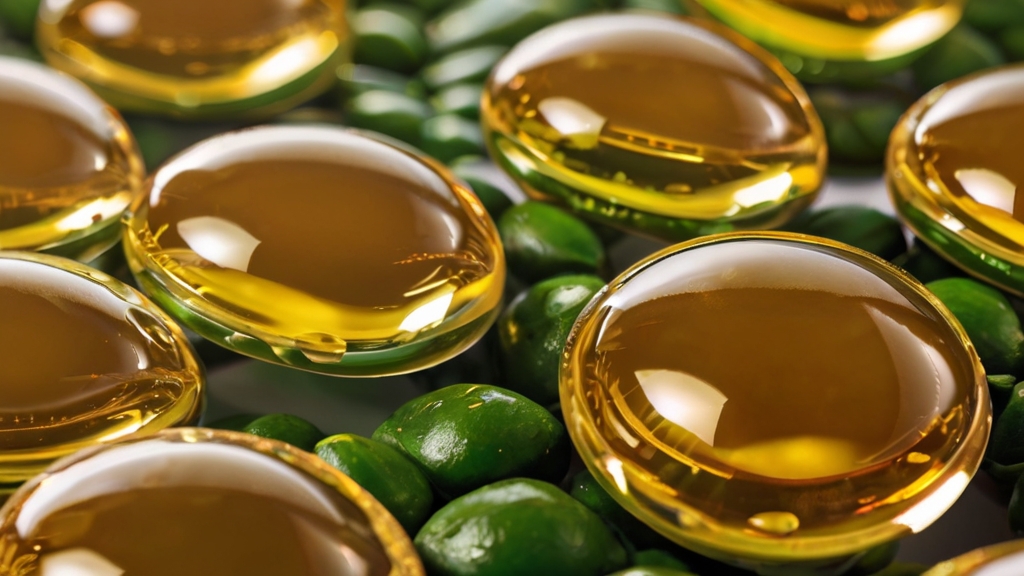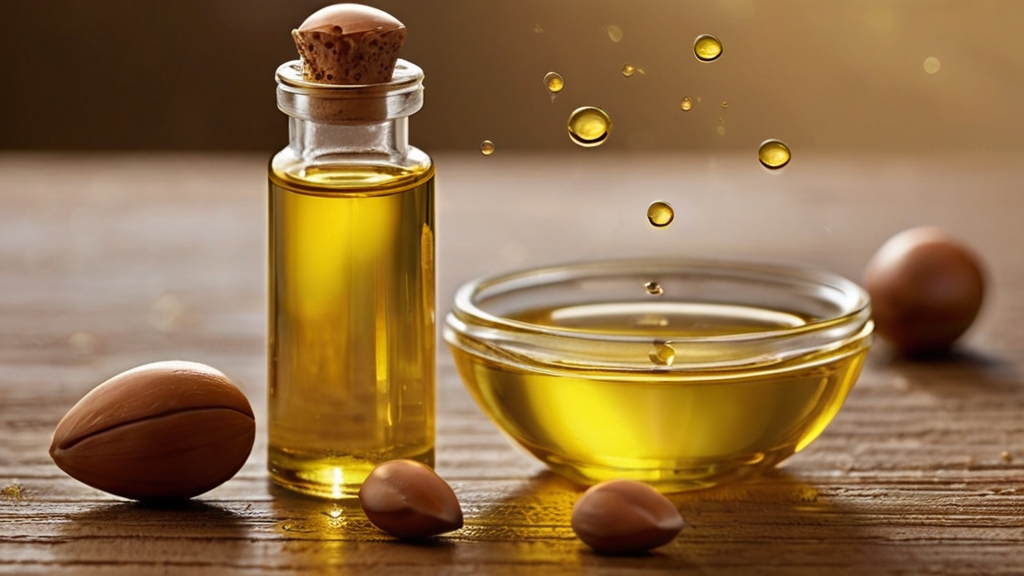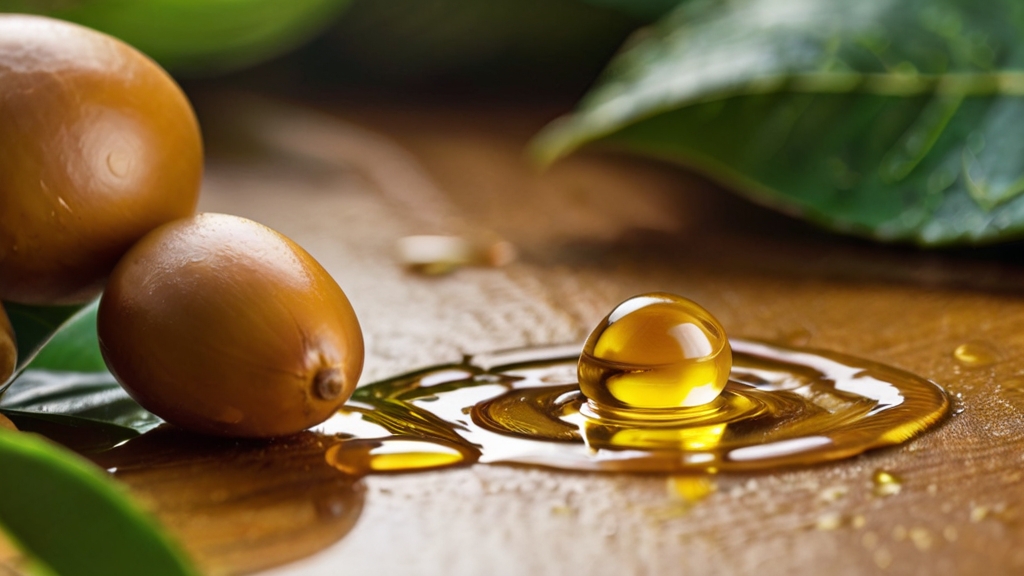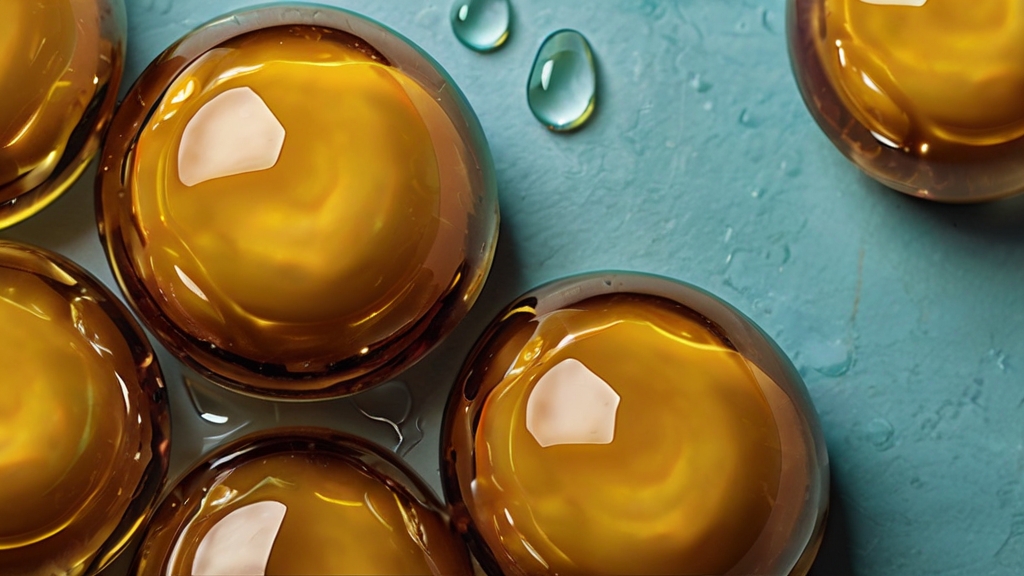
Amira Benhima
A passionate advocate for holistic wellness and natural beauty, is an accomplished author specializing in the benefits and uses of Argan oil, with years of experience exploring its wonders.
Key Takeaways
Imagine you’re in a time machine, transported back to an era where people relied on nature’s gifts for their well-being. Picture a secret elixir, derived from the seeds of the argan tree, that holds the key to nourishing your body from the inside out. This miraculous potion, known as argan oil, is a treasure trove of essential fatty acids. But what exactly is the nutritional value of these fatty acids in argan oil? And how can they benefit your health? Get ready to uncover the secrets of argan oil’s fatty acids and discover why incorporating this liquid gold into your daily routine may be the missing piece in your quest for optimal wellness.
- Argan oil is rich in omega-6 and omega-9 fatty acids, which support skin health, heart health, and blood sugar management.
- The linoleic acid in argan oil helps maintain skin barrier function, hydration, and elasticity.
- Argan oil contains oleic acid, which enhances the nutritional value, provides energy, and aids in vitamin absorption.
- Argan oil also contains palmitic acid and stearic acid, which contribute to skin barrier function, hydration, and overall skin health.
Omega-6 Fatty Acids in Argan Oil

Argan oil boasts a significant content of omega-6 fatty acids, particularly linoleic acid, which plays a crucial role in promoting skin health and overall well-being. Linoleic acid, found in argan oil, is known for its ability to improve moisture levels and maintain the skin barrier. This helps to keep the skin hydrated and supple, preventing dryness and flakiness. In addition, the omega-6 fatty acids in argan oil have anti-inflammatory properties, which can potentially benefit skin conditions such as acne and eczema.
Linoleic acid in argan oil also contributes to the structure and function of cell membranes. It helps to maintain the integrity of the skin’s barrier, allowing it to retain moisture and stay hydrated. This, in turn, enhances the skin’s elasticity, making it smooth and plump. Moreover, the presence of omega-6 fatty acids in argan oil adds to its overall nutritional profile. These fatty acids are essential for the body’s health and well-being, and incorporating them into your skincare routine can provide additional benefits.
Omega-9 Fatty Acids in Argan Oil

Now, let’s explore the health benefits of omega-9 fatty acids found in argan oil. These fatty acids, particularly oleic acid, play a crucial role in promoting heart health by reducing LDL cholesterol levels. Additionally, omega-9 fatty acids contribute to skin health by enhancing hydration and elasticity. By incorporating argan oil rich in omega-9 fatty acids into your diet, you can potentially reduce inflammation and support overall well-being.
Health Benefits of Omega-9
Consuming omega-9 fatty acids found in argan oil can provide numerous health benefits, including supporting heart health and reducing the risk of heart disease. Argan oil is rich in oleic acid, an omega-9 fatty acid that makes up a significant portion of its fat content. Studies have shown that omega-9 fatty acids in argan oil can help lower bad LDL cholesterol levels and triglycerides, both of which are risk factors for heart disease. Additionally, oleic acid in argan oil has antioxidant properties that can improve overall heart health. Animal studies have also suggested that argan oil consumption may help manage blood sugar levels and insulin resistance. The omega-9 fatty acids in argan oil also contribute to its potential anti-inflammatory benefits, further supporting its overall health benefits.
Omega-9 Sources and Benefits
Incorporating argan oil into your diet provides a rich source of omega-9 fatty acids, primarily oleic acid, which offers numerous health benefits. Omega-9 fatty acids in argan oil contribute to heart health by reducing LDL cholesterol levels and improving overall cardiovascular function. The presence of oleic acid, an omega-9 fatty acid in argan oil, also supports skin health by enhancing moisture retention and promoting skin elasticity. Furthermore, the omega-9 fatty acids in argan oil help reduce inflammation, making it beneficial for various skin conditions like acne and eczema. In addition to its anti-inflammatory properties, argan oil provides antioxidant benefits as well. By incorporating argan oil with its omega-9 fatty acids into your diet, you can support overall health and well-being.
Linoleic Acid in Argan Oil

Now let’s talk about the health benefits of linoleic acid in argan oil. This essential fatty acid plays a crucial role in maintaining skin health by supporting the skin’s barrier function and hydration. It also helps promote cell membrane structure and integrity, reducing inflammation and improving overall skin health. Additionally, the linoleic acid in argan oil can be beneficial for hair care, making it a versatile and valuable ingredient.
Health Benefits of Linoleic Acid
Linoleic acid in argan oil supports your skin’s health and hydration by maintaining the skin barrier function and reducing inflammation. As an essential omega-6 fatty acid, it plays a crucial role in promoting overall skin health. Linoleic acid makes up 29-36% of the fat content in argan oil, making it a valuable source of this nutrient. Research suggests that linoleic acid in argan oil may benefit individuals with acne-prone skin by regulating sebum production. By incorporating linoleic acid into your diet through argan oil, you can promote moisture retention and improve the health of your skin. Including this nutrient in your skincare routine can help you achieve a hydrated and healthy complexion.
Role of Linoleic Acid in Skin Health
To understand the role of linoleic acid in promoting skin health, it is important to recognize its significant presence in argan oil. Linoleic acid accounts for 29-36% of the fat content in argan oil, making it a valuable component for skin health. This essential fatty acid plays a crucial role in maintaining the skin’s barrier function and reducing inflammation. It also helps improve skin hydration and overall skin health. Linoleic acid is particularly beneficial for managing conditions like acne, as it helps regulate sebum production. Additionally, when applied topically, it supports wound healing and skin regeneration processes. With its numerous benefits, linoleic acid in argan oil is a valuable addition to skincare routines, promoting healthy and nourished skin.
Linoleic Acid and Hair Care
Regularly incorporating argan oil into your hair care routine can provide moisturizing benefits and promote healthy hair due to its high linoleic acid content. Linoleic acid, which makes up 29-36% of argan oil’s fat content, plays a crucial role in hair health and hydration. It helps promote cell growth in hair follicles, potentially aiding in hair protection. While its effect on hair growth is inconclusive, linoleic acid in argan oil may help prevent inflammation on the scalp. This nourishing property of linoleic acid makes argan oil a popular choice in hair care products. By moisturizing and nourishing your hair, argan oil with its linoleic acid content can contribute to keeping your hair healthy and hydrated.
Oleic Acid in Argan Oil

Oleic acid, a monounsaturated fatty acid found abundantly in argan oil, plays a vital role in supporting heart health and reducing bad LDL cholesterol levels. Here are four important facts about the role of oleic acid in argan oil:
- Heart Health: Oleic acid has been shown to have positive effects on cardiovascular health. It helps lower levels of LDL cholesterol, which is often referred to as the “bad” cholesterol. By reducing LDL cholesterol, oleic acid helps maintain healthy blood vessels and reduces the risk of heart disease.
- Antioxidant Properties: Argan oil, which is rich in oleic acid, also possesses antioxidant properties. Antioxidants help protect the body against free radicals, which can cause cellular damage and contribute to chronic inflammation. By reducing inflammation, oleic acid may help prevent or manage various health conditions, including cardiovascular diseases.
- Triglyceride Levels: Consumption of oleic acid has been associated with lower triglyceride levels. High levels of triglycerides are linked to an increased risk of heart disease. By incorporating argan oil into your diet, you can potentially lower your triglyceride levels and improve your overall cardiovascular health.
- Nutritional Value: The presence of oleic acid in argan oil enhances its nutritional value. Oleic acid is an essential nutrient that provides energy and helps the body absorb fat-soluble vitamins. Incorporating argan oil into your meals can contribute to a well-rounded and healthy diet.
Palmitic Acid in Argan Oil

Palmitic acid, a saturated fatty acid present in argan oil, contributes to its stability and emollient properties in skincare and haircare products. Despite being a saturated fat, palmitic acid in argan oil is not as harmful as artificially produced trans fats found in processed foods. In fact, palmitic acid plays a role in maintaining skin barrier function and preventing moisture loss, making it beneficial for dry skin conditions.
Argan oil, with its significant palmitic acid content, is highly valued in skincare and haircare products due to its ability to provide deep hydration and nourishment. The emollient properties of palmitic acid help to soften and soothe the skin, making it an ideal ingredient for moisturizers, creams, and lotions. When applied to the hair, argan oil with palmitic acid helps to reduce frizz, improve manageability, and add shine.
Furthermore, research suggests that palmitic acid in argan oil may have anti-inflammatory properties. This makes it particularly useful for individuals with inflammatory skin conditions such as eczema and psoriasis. By reducing inflammation, palmitic acid can help alleviate symptoms and provide relief.
Stearic Acid in Argan Oil

Stearic acid, a saturated fatty acid found in argan oil, contributes to its overall nutritional profile and potential health benefits. Here’s why stearic acid in argan oil is beneficial for your skin health:
- Maintaining the skin’s protective barrier: Stearic acid helps to strengthen and maintain the skin’s protective barrier. This barrier acts as a shield against external aggressors, such as pollutants and irritants, helping to keep your skin healthy and protected.
- Stabilizing the oil: Stearic acid plays a crucial role in stabilizing argan oil. It helps to maintain the oil’s consistency, giving it a solid form at room temperature. This stability ensures that the oil remains intact and effective for longer periods.
- Prevention of oxidation: Argan oil is rich in antioxidants, and stearic acid contributes to its antioxidant properties. These antioxidants help to prevent the oxidation of the oil, which can lead to rancidity and a decrease in its beneficial effects.
- Enhancing the nutritional profile: Including stearic acid in argan oil adds to its overall nutritional value. Along with other fatty acids, stearic acid provides essential nutrients that nourish the skin and support its overall health.
Saturated Fatty Acids in Argan Oil

To further explore the nutritional composition of argan oil, let’s now delve into the saturated fatty acids it contains. Saturated fatty acids are an essential component of our diet, and they play a role in the stability and shelf-life of argan oil. Consuming saturated fats in moderation is important for maintaining a balanced diet.
Argan oil contains approximately 1.4g of saturated fatty acids per tablespoon, which is relatively lower compared to some other cooking oils. The level of saturated fatty acids in argan oil can vary depending on the extraction process and quality. This variation is important to consider when choosing argan oil for its nutritional benefits.
While it is true that excessive consumption of saturated fats can have negative health effects, it is important to note that they are an essential part of a balanced diet. Saturated fatty acids provide the body with energy and aid in the absorption of certain vitamins. They also contribute to the flavor and texture of foods.
In terms of cooking oils, argan oil with its lower levels of saturated fatty acids can be a favorable option. It provides a unique flavor profile and can be used in various culinary applications. However, as with any oil, it is important to consume it in moderation as part of a well-balanced diet.
Frequently Asked Questions
Is Argan Oil Rich in Fatty Acids?
Yes, argan oil is rich in fatty acids. In fact, it contains a significant amount of essential fatty acids, such as oleic acid and linoleic acid. These fatty acids offer numerous benefits for your skin, helping with hydration and maintaining a healthy skin barrier. They also play a role in promoting hair health. Compared to other oils, argan oil stands out as a great source of these essential fatty acids. You can easily incorporate it into your diet or use it topically for its nourishing properties.
What Are the Nutrients in Argan Oil?
Argan oil is a nutrient-rich oil that offers numerous health benefits. It is packed with omega fatty acids, which support heart health and reduce inflammation. The oil’s high antioxidant content, especially Vitamin E, helps protect your cells from damage. Argan oil is also great for moisturizing your skin and promoting healthy hair. In culinary uses, it adds a delicious nutty flavor to dishes. However, be aware of potential allergic reactions and compare its nutritional value with other oils.
What Is the Acid Value of Argan Oil?
The acid value of argan oil is a measure of the free fatty acids in the oil. It helps determine the quality and stability of the oil. A lower acid value indicates higher quality and better shelf life. Argan oil has numerous benefits for the skin and hair, and can be used in cooking as well. It has antioxidant properties and can be used as a natural remedy for dry scalp. Organic argan oil is important for its sustainability and it can also reduce inflammation and potentially treat acne. The process of extracting argan oil is crucial for its overall impact.
What Is Argan Oil Rich In?
Argan oil is rich in health benefits. It can be used in cooking, providing a delicious flavor and omega fatty acids for heart health. It also moisturizes the skin, promotes hair care, and has anti-aging properties. With its high Vitamin E content, it acts as a powerful antioxidant, offering protection against free radicals. Argan oil can be used as a nutritional supplement and is an essential part of traditional Moroccan beauty rituals.
Related Articles
Argan Oil Production From Argania Spinosa
Kept under lock and key, the secrets of argan oil production from Argania spinosa reveal the hidden treasures of this legendary liquid gold.
Harvesting Argan for Organic Oil Production
Ponder the remarkable benefits and sustainable practices involved in harvesting argan for organic oil production, and discover the intriguing role of women and unique extraction methods.
Health Benefits of Pure Argan Oil
Jumpstart your health and discover the surprising benefits of pure argan oil, from glowing skin to potential cancer-fighting properties.


